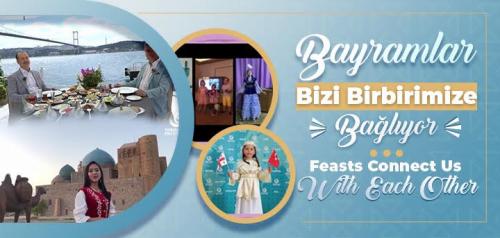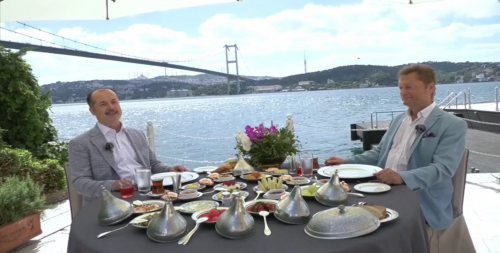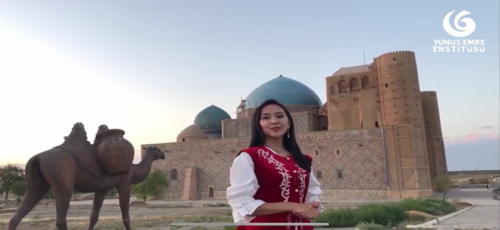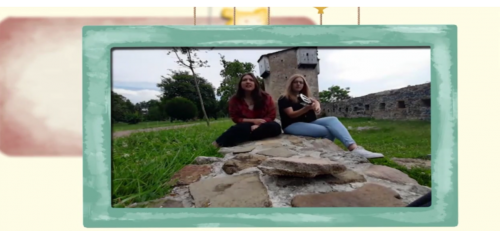“Feasts Bind Us Together”
The programme realised by the Yunus Emre Institute exclusively in celebration of the Feast of Sacrifice has reached every corner of the world. First off, Alper Tuna, Ayşe Yüce and Mert Talat Dilekçioğlu from ‘Türkçe’nin Sesi’ (Voice of Turkish) Radio extended best wishes on the occasion of the feast from all over the world. In conversation on the programme, the Institute Head, Prof. Dr. Şeref Ateş, hosted a celebrated name from the world of Turkish cuisine: Osman Selim. In the programme’s discussion of the traditions behind the Feast of Sacrifice, he observed that, “The Feasts bind us together.”
 Head of the Yunus Emre Institute Prof. Dr. Şeref Ateş hosted one of the doyens of Turkish cuisine, Osman Selim in the Esma Sultan Mansion on the first day of the feast. First off, Alper Tuna, Ayşe Yüce and Mert Talat Dilekçioğlu from ‘Türkçe’nin Sesi’ (Voice of Turkish) radio extended best wishes on the occasion of the feast from all over the world. In the programme, where the tradition of the Feast of Sacrifice, such as the feast breakfast, and the sharing of culture were discussed, Prof. Dr. Şeref Ateş and Osman Selim explained a tradition passed down the lineage of humanity: the feast. In the programme broadcast by Yunus Emre Institute exclusively for the Feast of Sacrifice, the joy of the feast and a message of friendship were shared with the entire world. Broadcast on the social media accounts of the institute, the programme was watched by thousands of people.
Head of the Yunus Emre Institute Prof. Dr. Şeref Ateş hosted one of the doyens of Turkish cuisine, Osman Selim in the Esma Sultan Mansion on the first day of the feast. First off, Alper Tuna, Ayşe Yüce and Mert Talat Dilekçioğlu from ‘Türkçe’nin Sesi’ (Voice of Turkish) radio extended best wishes on the occasion of the feast from all over the world. In the programme, where the tradition of the Feast of Sacrifice, such as the feast breakfast, and the sharing of culture were discussed, Prof. Dr. Şeref Ateş and Osman Selim explained a tradition passed down the lineage of humanity: the feast. In the programme broadcast by Yunus Emre Institute exclusively for the Feast of Sacrifice, the joy of the feast and a message of friendship were shared with the entire world. Broadcast on the social media accounts of the institute, the programme was watched by thousands of people.
 Trainees of the Yunus Emre Institute, who were learning Turkish, sang Barış Manço’s “Bugün Bayram Çocuklar” (Children, Today the Feast Begins) during the programme. A video clip of Alper Tuna’s work “Bayram İyiliktir” (The Feast is an Act of Good) was also broadcast during the programme. Turkish songs, including folk songs, were sung by Burcu Karadağ, Ozan Sarıboğa, Alafsar Rahimov, Sedat Solakoğlu, and Serkan Halili in a music programme devised by ney player Burcu Karadağ during later hours of the programme.
Trainees of the Yunus Emre Institute, who were learning Turkish, sang Barış Manço’s “Bugün Bayram Çocuklar” (Children, Today the Feast Begins) during the programme. A video clip of Alper Tuna’s work “Bayram İyiliktir” (The Feast is an Act of Good) was also broadcast during the programme. Turkish songs, including folk songs, were sung by Burcu Karadağ, Ozan Sarıboğa, Alafsar Rahimov, Sedat Solakoğlu, and Serkan Halili in a music programme devised by ney player Burcu Karadağ during later hours of the programme.
“PREPARATIONS HAD BEGUN MONTHS EARLIER”
In a special conversation held in Esma Sultan Mansion during the feast breakfast, Prof. Dr. Ateş posed the following question, “We generally experience a sense of urgency around Feasts of Sacrifice. How would you explain this?” Osman Selim explained the feast tradition, so fondly recalled by older generations, as follows:
“We sense this urgency even today, even though preparations were made months beforehand. New clothes were bought for children, and such shopping was not left to the last minute. Clothing stores were far less numerous back then. One in particular in Istanbul was Mahmutpaşa. Meanwhile, concerning the element of sacrifice itself, the sacrificial animal would be selected by the father or grandfather of the household. These animals were tethered in front of houses to the window rails prevalent in those times. The animal was selected some days beforehand. Once slaughtered, it fell upon us, the children, to distribute the meat. My brother and I would walk around with portions of meat of one, or half a kilogram, and their destinations were clear to us. Even various desserts made on the Feast of Sacrifice were distributed to neighbours. Men would attend the Feast prayer, and extraordinarily little could be eaten beforehand. Meanwhile, women would make their preparations at home. Animals were sacrificed after prayers. And only then would a lavish breakfast table be set. The hour was not early, and usually around 11 a.m. given the aforementioned timing of the actual sacrificing, the feast breakfast takes place an hour between lunch and breakfast. Lunch is not eaten on that day in any case. The sautéed meat of the sacrificial animal would without fail be served once the breakfast had commenced.”
"FEASTS BIND US TOGETHER"
Touching upon the history of the sacrificial feast that dates back thousands of years, Prof. Dr. Şeref Ateş mentioned that in this feast sharing was the primary consideration, adding that;
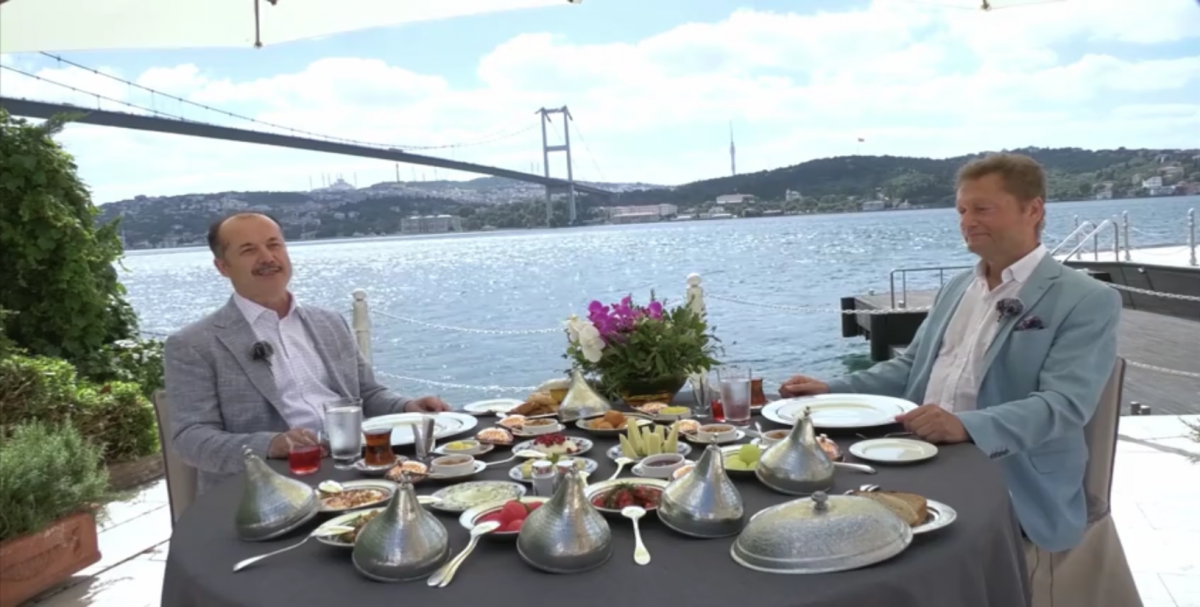 “It is as important to distribute the meat to others as it is to make the actual sacrifice itself. Then comes the second part: the feast table itself. The sacrificial table in all likelihood dates back to the beginning of the tradition, perhaps around five thousand years. It is also rumoured that Prophet Abraham would never eat a meal alone. What is the significance of the feast table, especially in terms of sharing?”
“It is as important to distribute the meat to others as it is to make the actual sacrifice itself. Then comes the second part: the feast table itself. The sacrificial table in all likelihood dates back to the beginning of the tradition, perhaps around five thousand years. It is also rumoured that Prophet Abraham would never eat a meal alone. What is the significance of the feast table, especially in terms of sharing?”
Osman Selim answered this question as follows:
Prof. Dr. Şeref Ateş: It is as important to distribute the meat to others as it is to make the actual sacrifice. Then comes the second stage: the feast table itself. The sacrificial table in all likelihood dates back to the beginning of the tradition, perhaps around five thousand years. It is also rumoured that Prophet Abraham would never eat a meal alone. |
“Feasts have the property of binding us together. What does this stem from? The culture of visiting the elderly is very deep-rooted and exists to this day, although we prefer to come together with food and drink. And so, as children visit their parents, their favourite foods are prepared.”
Reminding us that palatal delight is acquired in childhood years, Şeref Ateş touched upon its relation to the emotions: “We can recall the tastes acquired in childhood even after long years have passed. Recalling the taste on the palate... That is why it is called palatal delight in our culture. May you never lose your palatal delight. Because itis not merely a matter of the delicacy and quality of the food itself, but of its capacity to affect how you feel.”
Prof. Dr. Şeref Ateş: We can remember the taste we acquire in our childhood even after long years. Recalling the taste on the palate... That is why it is called palatal delight in our culture. May you never lose your palatal delight. Because it is not merely a matter of the delicacy and quality of the food itself, but of its capacity to affect how you feel. |
Mentioning its appeal to palatal delight, in addition to the unifying nature of the feast, Osman Selim noted that, “According to the scientific studies conducted, a person’s palatal delight is determined by what (s)he eats from the womb until 6 years of age.
"IMMIGRANT CUISINE"
In response tothe question posed by Prof. Dr. Şeref Ateş on whether immigrant culture had impacted Turkish cuisine, Osman Selim replied,
Osman Selim: Turkish cuisine has its characteristics, and many variations. I know no other immigrant cuisine that spans around 7-8 thousand kilometres, starts in the 700s and spans approximately a thousand 300- a thousand 400 years. |
“Turkish cuisine has its characteristics, and many variations. I know no other immigrant cuisine that spans around 7-8 thousand kilometres, starts in the 700s and spans approximately a thousand 300- a thousand 400 years. The Ottoman Empire lasted around 600 years, and we also inherited much from the civilization that preceded it. Istanbul has a unique property that no other city has in this sense. It is the only city in the world to have become the capital of two separate empires. Two meals were eaten by the Ottomans: one around 10-11 a.m. and the other before dawn."
Drawing the attention to the fact that the word “kahvaltı” (breakfast) is derived from the words “kahve” (coffee) and “altı” (under),Osman Selim stated that breakfast was the meal eaten before coffee, and that the Turkish breakfast is known to be the richest in the world.”
"BAYRAM İYİLİKTİR"
 Prof. Dr. Şeref Ateş stressed that in Turkish culture the principle of eating two meals a day is associated with health, citing the expression, “anuntimely meal brings head and stomach aches.” Prof. Dr. Ateş asked if the mood of the person cooking had any effecton the food cooked, to which Osman Selim replied, “When mothers and grandmothers cook their children’s favourite meals to make them happy it is a reward in itself.”
Prof. Dr. Şeref Ateş stressed that in Turkish culture the principle of eating two meals a day is associated with health, citing the expression, “anuntimely meal brings head and stomach aches.” Prof. Dr. Ateş asked if the mood of the person cooking had any effecton the food cooked, to which Osman Selim replied, “When mothers and grandmothers cook their children’s favourite meals to make them happy it is a reward in itself.”
A video clip of the song “The feast is goodness itself” was broadcast during the programme. The artist, Alper Tuna said in relation to the creation of the song, “I thought about the operations of our institute, influenced by the philosophy of Yunus, and of our humanitarian leaning that reaches across the world in an endeavour to extend good. I wanted to leave a keepsake of today. On this occasion, we shut ourselves in a studio for two days with our musician friends and created a piece of music that we present for your enjoyment.”
UNIVERSAL TUNES FROM YUNUS EMRE TO AŞIK VEYSEL
 Burcu Karadağ and other musicians sang songs of universal joy and accompanied on an assortment of instruments in celebration of the Feast of Sacrifice. The musical repertoire curated by Karadağ featured Yunus Emre’s “Gel Gör beni Aşk Neyledi”, hymns such as “Sordum Sarı Çiçeğe”, the famous folk poet’s folk song “Allı Turnam”, the Azerbaijani song “Hamidan Gözel Menem", a song entitled "Çadırımın Üstüne Şıp Dedi Damladı" and a folk song from the Black Sea Region "Çayelinden Öteye". The pieces were performed by pianist Ozan Sarıboğa, balaban player Alafsar Rahimov and dombra player Sedat Solakoğlu. Qanun player Serkan Halili performed the piece Vokal Konçerto.
Burcu Karadağ and other musicians sang songs of universal joy and accompanied on an assortment of instruments in celebration of the Feast of Sacrifice. The musical repertoire curated by Karadağ featured Yunus Emre’s “Gel Gör beni Aşk Neyledi”, hymns such as “Sordum Sarı Çiçeğe”, the famous folk poet’s folk song “Allı Turnam”, the Azerbaijani song “Hamidan Gözel Menem", a song entitled "Çadırımın Üstüne Şıp Dedi Damladı" and a folk song from the Black Sea Region "Çayelinden Öteye". The pieces were performed by pianist Ozan Sarıboğa, balaban player Alafsar Rahimov and dombra player Sedat Solakoğlu. Qanun player Serkan Halili performed the piece Vokal Konçerto.

